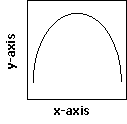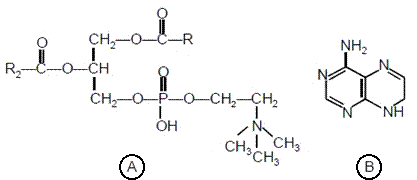NEET Biology, Class 11 MCQs | Biomolecules NEET Questions | Biomolecules MCQ | Biomolecules class 11 Question Bank | Biomolecules NEET MCQ | Biomolecules Biology NEET MCQ
Biomolecules: MCQs Quiz - 01
Congratulations - you have completed Biomolecules: MCQs Quiz - 01.
You scored %%SCORE%% out of %%TOTAL%%.
Your performance has been rated as %%RATING%%
Your answers are highlighted below.
Question 1 |
The curve given below show enzymatic activity with relation to three conditions (pH, temperature and substrate concentration). What do both axes (x and y) represent?


| x-axis | y-axis | |
| (1) | Enzymatic activity | Temperature |
| (2) | Enzymatic activity | pH |
| (3) | Temperature | Enzyme Activity |
| (4) | Substrate concentration | Enzymatic Activity |
Option (1) | |
Option (2) | |
Option (3) | |
Option (4) |
Question 2 |
Which one of the following structural formulae of two organic compounds is correctly identified along with its related function?


A : Lecithin - a component of cell membrane | |
B : Adenine - a nucleotide that makes up nucleic acids | |
A : Triglyceride - major source of energy | |
B : Uracil - a component of DNA |
Question 3 |
The ‘‘lock and key’’ model of enzyme action illustrates that a particular enzyme molecule
May be destroyed and resynthesised several times | |
Interacts with a specific type of substrate molecule | |
Reacts at identical rates under all conditions | |
Forms a permanent enzyme-substrate complex |
Question 4 |
One strand of DNA has the following sequence of nucleotide 3’ ATTCGCTAT 5’ so the other strand of DNA has
5’ TAAGCGATA 3’ | |
3’ TAAGCGATA 5’ | |
5’ GACGCGATA 3’ | |
3’ GACGCGATA 5’. |
Question 5 |
With reference to enzymes, which one of the following statements is true?
Apoenzyme = Holoenzyme + Coenzyme | |
Holoenzyme = Apoenzyme + Coenzyme | |
Coenzyme = Apoenzyme + Holoenzyme | |
Holoenzyme = Coenzyme – Apoenzyme |
Question 6 |
Feedback inhibition of enzymes is affected by which of the following
enzyme | |
substrate | |
end products | |
intermediate end products |
Question 7 |
Example of a typical homopolysaccharide is
Lignin | |
Suberin | |
Inulin | |
Starch |
Question 8 |
Which of the following is not a conjugated protein?
Peptone | |
Phosphoprotein | |
Lipoprotein | |
Chromoprotein |
Question 9 |
Chitin is a
Polysaccharide | |
Nitrogenous polysaccharide | |
Lipoprotein | |
Protein |
Question 10 |
Which one is diaminodicarboxylic amino acid?
Cystine | |
Lysine | |
Cysteine | |
Aspartic Acid |
Question 11 |
The effectiveness of an enzyme is affected least by
Temperature | |
Concentration of the substrate | |
Original activation energy of the system | |
Concentration of the enzyme |
Question 12 |
Which is an organic compound found in most cells?
Glucose | |
Water | |
Sodium chloride | |
Oxygen |
Question 13 |
Enzymes that catalyse inter-conversion of optical, geometrical or positional isomers are
Ligases | |
Lyases | |
Hydrolases | |
Isomerases |
Question 14 |
Fluidity of bio-membranes can be shown by
Electron microscope | |
Tissue culture | |
Phase-contrast microscope | |
Fluorescence microscope |
Question 15 |
The “Repeating Unit” of glycogen is
Fructose | |
Mannose | |
Glucose | |
Galactose |
Once you are finished, click the button below. Any items you have not completed will be marked incorrect.
There are 15 questions to complete.



sir, For question 7 Inulin is also a homopolymer of fructose.then, why ans can not be Inulin?could please explain,
If we talk deepley then inulin is a polymer of fructose + sulphuric acid , but normally we say it as polymer of fructose but it is not as complex as compare to starch because in starch many linkages are present like beta 1.,4 so it is a complex homopolysacchride
#Dr sameer khan
#Mbbs first year
In q-7 why not d ans inulin[fructosan & only b-1,2 gly bond present]?Plz reply sir.
wow its realy intresting